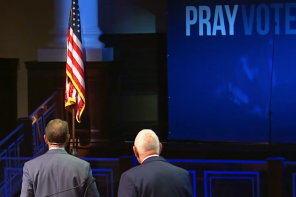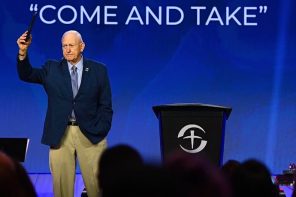It had to happen sooner or later. The Religious Right has devolved into pure goofiness:
At the Values Voters Summit, the annual conference for the religious right sponsored by the Family Research Council last weekend, conservative youth activist Jason Mattera evoked the battle of David against Goliath as a metaphor for conservative college students who are “persecuted” by the big bad liberals who control academia. “David has the righteous answer,” Mattera said, “because he is taking pride in his Christian beliefs.” No matter that Mattera didn’t accurately grasp David’s biography or the biblical timeline. In conserva-land, David, a character from the Old Testament, was a Christian even before Christ was born. “Anyone who came against his God,” Mattera said, “David would take it personally.”
Umm, no. As a rule, humans aren’t usually the main characters in biblical narratives. The stories are about God and God’s power. Modern readers tend to talk about David as a plucky young lad, an Old Testament Tintin, but the actual story is pretty clear that his success stems not from his bravery, but from God’s favor bestowed upon him.
This level of biblical illiteracy is hardly surprising. Many Americans—Evangelicals in particular—are prone to reading scriptural passages out of context. We as a nation are also fond of glib summaries of what the Bible says, rather than encounters with the texts themselves.
We’re just lucky that Mattera didn’t talk about David defeating his talking dog.
That being said, progressive opponents of the Values Voters should resist the temptation to dismiss religious conservatives as simple ignoramuses. Don’t get me wrong: Mattera is an ignoramus. There’s more than meets the eye here, though. As Sarah Posner notes in her brief from the Values Voters Summit, Mattera’s point is part of a larger narrative:
It was no accident that Mattera chose the David and Goliath metaphor. Conservatives now see themselves as the underdogs in an epic battle against their progressive enemies. All weekend, speaker after speaker tapped into the grievance litany of the religious right’s siege mentality: Texas Governor Rick Perry complained about the “assault on our shared values”; former presidential candidate Mitt Romney blamed “liberal big government” for America’s problems and lauded tea party “patriots”; Brian Fischer, director of issue analysis at the American Family Association, suggested that the idea of separation of church and state came from Hitler and denies Christians’ freedom; radio host Crane Dunham complained that activists’ “core set of beliefs are violated” because “you are taxed from moment you wake up till the time you go to bed at night”; Bishop Harry Jackson, crusader against gay marriage in the District of Columbia, complained that gay lawyers run K Street and don’t understand the plight of poor, black single mothers across town.
The David and Goliath narrative, says Posner, is the Religious Right bid to recapture its share among youth, who are steadily trending left. How they imagine that will work is less clear.
Mark Silk will accuse me of indulging in “professorial thumb sucking” for bringing it up, but as it happens, I’ve been reading about the overarching story of conservative persecution in a hefty new anthology from the Russell Sage Foundation titled Evangelicals and Democracy in America. In a chapter on Conservative Protestantism, Philip S. Gorski posits what he calls “the Covenant-Apostasy-Revival Trope,” or CART:
The CART recounts American history, and indeed any history, as a story in three acts: a primordial golden age of religious faith and social order (covenant), which is followed by a period of religious apostasy and social decline, necessitating an age of religious revival and social restoration.
It’s not difficult to see how this applies to the conservative religious view of the American story:
The golden age begins with a founding agreement between the Christian God and the American people. When the people fall away from the covenant, God punishes them by withdrawing his blessings and unleashing his wrath. To win back God’s grace, the people must return to the covenant.
In fact, the CART narrative is all over American history:
The trope is old and enduring. It is rooted in the Old Testament, played a pivotal role in the development of European nationalism, was inserted into the Mayflower Compact, and has remained a fixture of Protestant narratives about America ever since. Today, it can be found in history texts for Christian home-schoolers, in the jeremiads of Christian nationalist clergymen, and even in the writings of some conservative historians. It is even accepted by many liberal secularists, at least insofar as it suggests that conservative Protestantism is the remnant of a premodern tradition.
So the story being liturgized at the Values Voters Summit is Gorski’s CART, with the addition of a narrative of resentment of those who would block the revival, in the eyes of the Summit attendees.
Understanding this leads me at least to a couple of conclusions. First and simply, people like Mattera (or the others Posner mentions) get their biblical narrative wrong not because they’re dumb per se, but because they are in the thrall of what is for them a larger story: the CART. That is their political worldview, and it ought to be respected for its power. But it is also their biblical hermeneutic, which is how the thousand years between King David and Jesus comes to be collapsed. Again, it ought to be respected for its power, if nothing else.
A bit more abstractly, Gorski suggests a counter-narrative to the CART: the Tradition-Modernity-Secularity Trope, which runs something like, first people were mired in ignorance and superstition, then came the Enlightenment, and now religion is an atavism slowly but surely on the decline.
That’s an equally powerful narrative held by many people, most notably the “new Atheists.” It has its ups and downs and its own particular reading of American history, starting with all those deistic founding fathers. While I’m not here to critique the TMST, as Gorski calls it, I will say that it seems inadequate to the task of overcoming the CART. In fact, the two only seem to fuel one another by buying into mutual resentment and hostility. I don’t know how anyone else feels, but every time the creationism vs. science debate pops up again, a piece of me dies.
A better narrative is needed, one that understands that faith will not be withering on the vine anytime soon, but one that also understands that there’s more to America than compliance with a particular construction of God’s will. I’d suggest King’s dictum that “the moral arc of the universe is long, but it bends toward justice,” but there are so many examples of it bending away, I’m not sure it holds up.
Perhaps a better one would be something like the Continual Renewal Trope. After all, David did slay Goliath. And then Uriah, and a bunch of other people. If the biblical story tells us anything, it’s that there’s only one messiah you can trust, and that one we nailed up on the cross. Try reading that trope into American history and see what you come up with.




